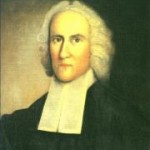 As the new year approaches, I’ve been hearing the phrase “New Year Resolutions” uttered in recent days. The best list of Resolutions I’ve ever read was written almost 300 years ago by the great preacher/author/theologian Jonathan Edwards when he was around 20 years of age. His was a list of 70 Resolutions or “purpose statements” that will have guided the rest of his life.
As the new year approaches, I’ve been hearing the phrase “New Year Resolutions” uttered in recent days. The best list of Resolutions I’ve ever read was written almost 300 years ago by the great preacher/author/theologian Jonathan Edwards when he was around 20 years of age. His was a list of 70 Resolutions or “purpose statements” that will have guided the rest of his life.
I like the practicality of his list and its transparency to the reality of the human nature and frailties. It permeates every area of life–the use of time, eating and drinking, conversations, relationships with family & others, prayer, etc. (I Cor. 10:31)
Some of my favorites among his list:
24. Resolved, Whenever I do any conspicuously evil action, to trace it back, till I come to the original cause; and then, both carefully endeavour to do so no more, and to fight and pray with all my might against the original of it.
30. Resolved, To strive every week to be brought higher in religion, and to a higher exercise of grace, than I was the week before.
36. Resolved, Never to speak evil of any, except I have some particular good call to it. Dec. 19, 1722.
37. Resolved, To inquire every night, as I am going to bed, wherein I have been negligent,—what sin I have committed,—and wherein I have denied myself;—also, at the end of every week, month, and year. Dec. 22 and 26, 1722.
41. Resolved, to ask myself, at the end of every day, week, month, and year, wherein I could possibly, in any respect, have done better. Jan. 11, 1723.
46. Resolved, Never to allow the least measure of any fretting or uneasiness at my father or mother. Resolved, to suffer no effects of it, so much as in the least alteration of speech, or motion of my eye; and to be especially careful of it with respect to any of our family.
47. Resolved, To endeavour, to my utmost, to deny whatever is not most agreeable to a good and universally sweet and benevolent, quiet, peaceable, contented and easy, compassionate and generous, humble and meek, submissive and obliging, diligent and industrious, charitable and even, patient, moderate, forgiving, and sincere, temper; and to do, at all times, what such a temper would lead me to; and to examine strictly, at the end of every week, whether I have so done. Sabbath morning, May 5, 1723.
52. I frequently hear persons in old age say how they would live, if they were to live their lives over again: Resolved, That I will live just so as I can think I shall wish I had done, supposing I live to old age. July 8, 1723.
54. Resolved, Whenever I hear anything spoken in commendation of any person, if I think it would be praiseworthy in me, that I will endeavour to imitate it. July 8, 1723.
56. Resolved, Never to give over, nor in the least to slacken, my fight with my corruptions, however unsuccessful I may be.
57. Resolved, When I fear misfortunes and adversity, to examine whether I have done my duty, and resolve to do it and let the event be just as Providence orders it. I will, as far as I can, be concerned about nothing but my duty and my sin. June 9, and July 13, 1723.
58. Resolved, Not only to refrain from an air of dislike, fretfulness, and anger in conversation, but to exhibit an air of love, cheerfulness, and benignity. May 27, and July 13, 1723.
60. Resolved, Whenever my feelings begin to appear in the least out of order, when I am conscious of the least uneasiness within, or the least irregularity without, I will then subject myself to the strictest examination. July 4 and 13, 1723.
63. On the supposition, that there never was to be but one individual in the world, at any one time, who was properly a complete Christian, in all respects of a right stamp, having Christianity always shining in its true lustre, and appearing excellent and lovely, from whatever part and under whatever character viewed: Resolved, To act just as I would do, if I strove with all my might to be that one, who should live in my time. Jan. 14, and July 13, 1723.
67. Resolved, After afflictions, to inquire, what I am the better for them; what good I have got by them; and, what I might have got by them.
69. Resolved, Always to do that, which I shall wish I had done when I see others do it. Aug. 11, 1723.
70. Let there be something of benevolence in all that I speak. Aug. 17, 1723
The printable version which grouped the list of Resolutions into several subheadings.


